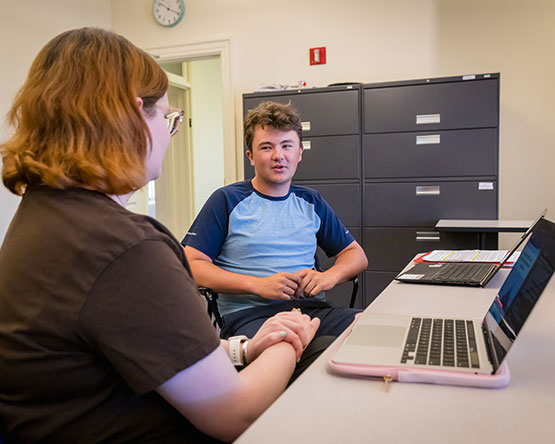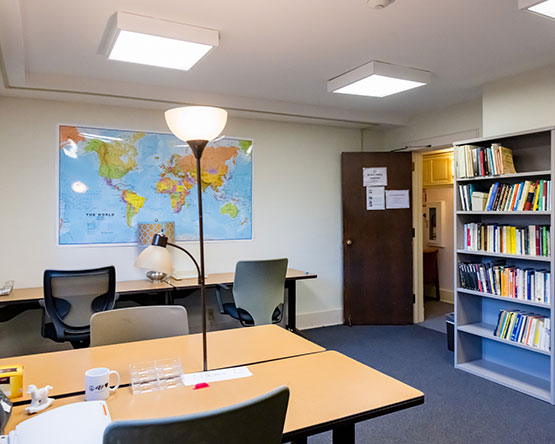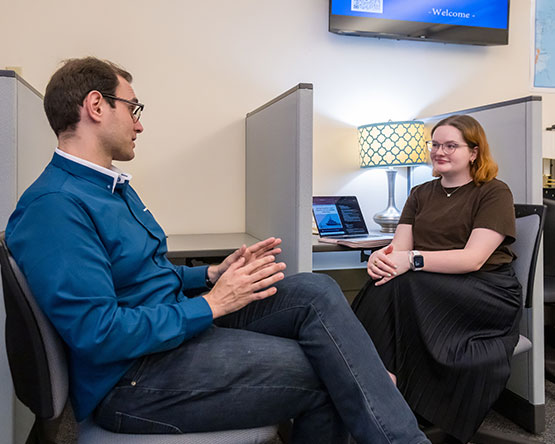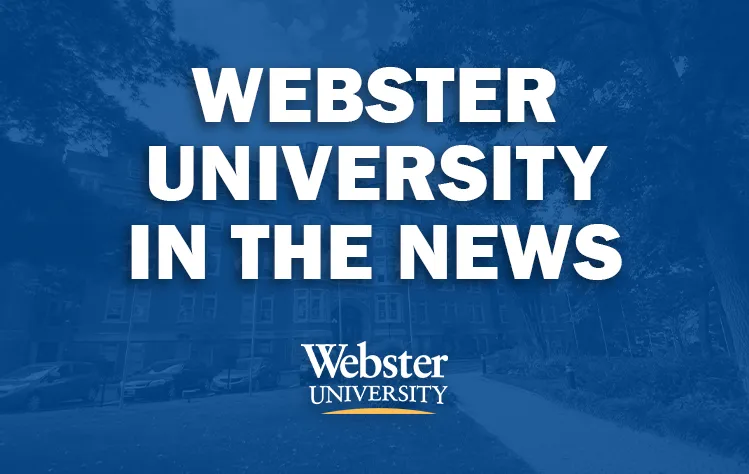About Our Research Lab
Webster University’s Global Policy Horizons Research Lab is a policy-focused research entity where students, lab researchers, affiliated faculty and members of the policy community from across disciplines can explore national and global security issues, generate original research and produce peer-reviewed policy papers and commentaries. The lab pursues innovative research focusing on unconventional threats, identity and security, role of technology in security, economic security, as well environmental and food security. The lab's goal is to become a knowledge hub that informs national governments and other members of the global policy community on contemporary and future security challenges.
The lab currently focuses on the following research streams:
- Unconventional Threats and Institutions
- Identity and Security
- Technology and Security
- Economic Security
- Environmental, Health and Food Security
Welcome from the Global Policy Horizons Research Lab Director
“Our Global Policy Horizons Lab at Webster University serves as a dynamic hub for cutting-edge research on pressing global security challenges. We bring together undergraduate and graduate researchers, faculty and professionals from around the world to analyze and develop policy-driven solutions that address the complex intersection of security and global affairs. At the lab, we foster interdisciplinary collaboration and innovative thinking, offering a unique space for students to engage with real-world problems and contribute to impactful policy recommendations. We are dedicated to shaping a safer and more just world through research and public policy.”
Dani Belo, PhD
Director, Global Policy Horizons Research Lab
Belo's Biography
Dani Belo, PhD, is a teacher and scholar of international relations, specializing in conflict management and security. He is currently an Assistant Professor of International Relations and leads the Global Policy Horizons Research Lab at Webster University in St. Louis, Missouri. Belo is also a Fellow at the Canadian Global Affairs Institute (CGAI) and the Norman Paterson School of International Affairs in Ottawa, Canada. His research focuses on gray-zone and hybrid conflicts, transatlantic security, grand strategy, NATO-Russia relations, ethnic conflicts and the post-Soviet region. He also worked as a policy analyst for the Government of Canada.
Belo's research on unconventional conflicts was featured at the U.S. Army Judge Advocate General’s Legal Center and School, the Royal Military College of Canada, the University of Pennsylvania Law School Center for Ethics and the Rule of Law, Columbia University’s Harriman Institute and the European Commission. He led international research projects in Poland and Estonia, focusing on interethnic relations and security. Several of his publications and presentations were used to inform international policy development at the U.S. State Department and Global Affairs Canada related to the conflict in Ukraine.

Global Hotspots in Focus

Israel-Hezbollah Conflict: Re-emerging Conflict Threatens Unstable Region (PDF) by Josh Hayes
The Israel-Hezbollah conflict reignited following the events of Oct. 7, 2023, and deepened when Israel entered Lebanon in Sept.2024 and has been a constant security concern in the region.

Policy Challenges in the Israel-Hezbollah Conflict: Iranian Influence Unveiled Summarized (PDF) by Samantha Ramay
Prompted by the Oct. 7, 2023, Hamas attacks in Israel, Hezbollah, assisted financially and militarily by Iran, entered the fighting in support of Hamas. The current ceasefire deal has left Lebanon with an opportunity for reform.

Resource Nationalism and Eco-Imperialism: Conflicting Views on Economic Mining Practices (PDF) by Xine Straw
Either by partial or total control, the governments of Latin American lithium mining countries have been trying to strike a balance between losing mining revenue and losing mining ventures entirely.
Our Publications
By Saira Iqbal
China’s role in the Kashmir conflict between 2021 and 2025 reflects its dual identity as both a mediator and a strategic stakeholder. Driven largely by realist interests, Beijing seeks to protect its investments in the China-Pakistan Economic Corridor (CPEC), contain India’s regional influence, and maintain stability to prevent nuclear escalation. While its quiet diplomacy has helped de-escalate crises, China’s perceived bias toward Pakistan limits its credibility as a neutral mediator and hinders lasting peace in South Asia.
View the full research paper on China and Kashmir conflict. (PDF)
By Hannah Peterson
The paper examines Iran’s ongoing human rights violations, particularly against women and activists, despite being a signatory to international treaties such as the ICCPR and CRC. It provides a comparative analysis of human rights conditions under the presidencies of Hassan Rouhani, Ebrahim Raeesi and Masoud Pezeshkian, revealing persistent oppression and lack of progress for women and student activists. In conclusion, the paper calls for accountability for Iranian officials responsible for treaty violations and emphasizes that efforts to promote reform should be approached with cultural sensitivity and respect for Iran’s societal context.
View the full research paper on women and activist right violations in Iran. (PDF)
By Dr. Zebo M. Isakova
The paper examines Uzbekistan’s economic security through the interconnected dimensions of health, environment, and food systems using the Climate-Resilient Green Growth (CRGG) framework. It discusses major initiatives such as the Vision-2030 Maternal and Perinatal Care Programme, the SAP022 Multi-Hazard Early Warning System, and the 2025 Water Code, all aimed at strengthening national resilience and sustainable development. The study concludes that Uzbekistan’s long-term economic stability depends on integrated governance, sustainable financing mechanisms and gender-inclusive policies that link health, climate, and food security to create a resilient and inclusive future.
By Kyndal Chapman
The paper examines how international law interacts with ongoing human rights issues in Qatar, Saudi Arabia, and the United Arab Emirates, focusing on freedom of speech, gender equality, and workers’ rights. Although these Gulf States have ratified several international treaties, enforcement remains weak due to factors such as religious reservations, censorship and the continuation of exploitative systems like Kafala that restrict the rights of migrant workers. The study concludes that a lack of legal enforcement and political will has prevented meaningful progress, calling for stronger international accountability, cooperation and reform to ensure that human rights are upheld across the Gulf region.
View the full research paper on international law and Gulf States rights. (PDF)
By Saira Iqbal and Xine Straw
Trump's tariff strategy used protectionist measures to reduce trade deficits and leverage immigration, increasing costs and straining relations. Biden maintained tariffs but rebranded them to support labor rights and supply chain resilience, improving diplomacy yet sustaining inflation. Both approaches reinforced Mexico's economic dependence on the U.S., even as nearshoring and trade diversification offered new opportunities.
By Inmaculada Cepeda De La Cruz
Foreign aid policies often prioritize economic growth, but this paper argues that this approach fails to achieve genuine development. The research proposes a new model that is recipient-led and focused on local needs, advocating for international organizations to decentralize decision-making and prioritize social indicators.
View the full research paper on foreign financial aid. (PDF)
By Jemie Shrestha
This comparative study examines how effective the interventions of the United Nations Office on Drugs and Crime (UNODC) and the U.S. Agency for International Development (USAID) are in combating human trafficking in Bangladesh, India and Nepal. It highlights progress in prevention and victim support while identifying gaps in enforcement and survivor reintegration.
View the full review of anti-human trafficking efforts. (PDF)
By Bekhruz Khojimatov
Amidst biased reports on the war in Ukraine, this paper provides a clearer understanding by comparing it to the Bosnian War. Using two paradigms of international relations — constructivism and ethnic nationalism — the study analyzes quantitative and qualitative data to show the immense role of ethnic and national identity in the current conflict.
View the full comparison of the Bosnian and Ukraine wars. (PDF)
By Maya Asadova
This paper argues that Iran's long-term interest in Central Asia is a "shaping operation" to gain soft power, with its strongest influence being in Tajikistan. The research shows how Iran's actions, even in the face of setbacks, are part of a strategic effort to build cultural and political ties for future influence.
View the full paper on Iran's influence in Tajikistan. (PDF)
By William Hoepner
This paper explores Russia’s use of ambiguous and non-violent “gray zone” tactics in the Baltic Region since the collapse of the Soviet Union. It examines whether Russia is justified in leveraging social issues through soft power to exert pressure on post-communist states.
View the full examination of Russian gray zone tactics. (PDF)
By Cullen O’Connor
This policy recommendation argues that admitting Ukraine into NATO would force Russia to the negotiating table by limiting its military options. The goal is not regime change but to contain the conflict and deter future land grabs, while acknowledging that a complete Ukrainian victory is unlikely in the nuclear age.
By Naima Dawid
This research explores whether the presence of women in peacekeeping leadership roles positively impacts the educational aspirations of young girls in developing countries. It focuses on how this societal shift in gender roles influences adolescent girls' educational outcomes, particularly in secondary school.
View the full paper on the impact of female peacekeepers. (PDF)
By Blake Browning
As climate change makes the Arctic more accessible, this paper argues for new governance to manage rising geopolitical tensions and competition for resources. It proposes that Arctic nations should cooperate with non-Arctic states, such as China, rather than excluding them, to build stronger, legally binding agreements.
View the full paper on Arctic security and governance. (PDF)
By Josh Hayes
Prompted by the Oct. 7, 2023, Hamas attacks, this paper investigates the core drivers of Israel's foreign policy. It argues that the state's desire for survival, expressed through a strategy of regional hybridism, shapes its posture toward both state and non-state actors in the region.
By Zin Mar Khing
This research delves into a paradox of the post-Cold War era: why states transitioning to democracy with the help of international organizations (IOs) are experiencing a rise in illiberalism. The paper argues that these IOs have inadvertently contributed to democratic backsliding and autocratic reversion.
View the full paper on international organizations and democracy. (PDF)
By Leon Wiskie
This article analyzes the flaws in the European Union’s current strategy for countering Russian disinformation. It proposes a new approach based on societal resilience for liberal democracies and offers specific recommendations for nations like the Netherlands, France and Germany.
View the full paper on countering Russian disinformation. (PDF)
By Zin Mar Khing
Many predicted that NATO would become irrelevant after the Cold War, but this study explains its resilience and continued importance. It argues that the alliance's ability to evolve while preserving its core principles has cemented its role as a crucial force for peace and stability.
View the full paper on NATO's post-Cold War durability. (PDF)
By Kenneth Valenti
This study examines Japan's unique immigration policies and suggests a shift toward a more inclusive, multicultural model like Germany's. Using the Advocacy Coalition Framework (ACF), the research highlights the crucial role of diverse actors in shaping policy outcomes and offers insights for Japan's future.
View the full comparative analysis of Japan's immigration policies. (PDF)
By Denitsa Raichkova-Pena
This paper characterizes the EU-Russia relationship as a complex mix of conflict and cooperation. It argues for a new framework that promotes transparency, security and stability by addressing both areas of agreement and friction, especially in economic and energy security, international security and regional stability.
View the full paper on the EU and Russian Federation relationship. (PDF)
To Save the Environment: Sustainability at the Expense of the Salares (PDF) by Xine Straw
Countries in the lithium triangle have allowed and encouraged mining operations despite the protests of the indigenous communities living there that threaten the environment, the economic well-being of indigenous communities in mining territories, and in turn the culture of said indigenous peoples.
The Philadelphi Corridor: Examining a Major Impediment in Ceasefire Talks (PDF) by Josh Hayes
As mediators and parties discuss important concerns in Cairo and Doha, surrounding the ceasefire proposal for the Israel-Hamas War in Gaza, a seemingly small, albeit important sticking point has emerged: The Philadelphi Corridor.
By Naima Dawid
This paper explores the securitization of immigrant communities in the U.S. and Canada by analyzing their differing societal models: the "melting pot" and "mosaic." It investigates how these models influence immigrant assimilation, cultural identity and potential security concerns, particularly in the post-9/11 era. The study questions whether a lack of assimilation in a multicultural society could lead to marginalization and heightened security measures.
View the full working paper on societal fabric and immigration. (PDF)
By Samantha Ramay
This paper presents the Populist Democratic Backsliding (PDB) Model, which illustrates the connection between populism and democratic backsliding. The model argues that using a populist political style increases the risk of democratic backsliding, particularly through its role in the securitization process.
View the full working paper on the Populist Democratic Backsliding Model. (PDF)
By Zin Mar Khing
This review analyzes Daniel Yergin's book, which explores the intersection of global energy and geopolitics. The author examines the book's insights into the shale revolution and its impact on major powers, noting its strengths while also critiquing its limited focus on certain demand-side countries and the urgency of climate change. The paper concludes the book is a valuable resource for understanding the complex relationship between energy and international relations.
By Sara El Mir
This report examines Libya's continued instability since the fall of Moammar Gadhafi in 2011. It explores how power struggles, the rise of militias and foreign interference have deepened divisions, making the country vulnerable despite its oil wealth. The paper also highlights how the breakdown of state institutions has severely affected daily life for Libyans.
By Xine Straw
This paper discusses the environmental and economic impacts of lithium mining in Chile. While vital for the green energy transition and Chile's economy, current mining practices are causing unforeseen ecological damage to the region. The report raises a key question: do the economic benefits of lithium mining outweigh the environmental and social costs?
View the full international security report on Chile's lithium market. (PDF)
By Samantha Ramay
This report is an update on the conflict in Yemen (see May 2024 report), focusing on the Houthi's continued attacks on Red Sea shipping as of November 2024. It details the retaliatory strikes by the U.S.-led coalition and the Houthi response, interpreting these actions as part of a broader proxy conflict between Iran and the U.S. in the region.
View the updated international security report on Iran's intervention in Yemen. (PDF)
This report is an update on the May 2024 report.
By Josh Hayes
This updated report on the Israel-Gaza conflict (see May 2024 report) provides an overview of the war's evolution since the Oct. 7, 2023, attacks. It discusses the humanitarian crisis in Gaza, the military and political challenges in the region, and the stalled diplomatic efforts. It also notes the conflict's expansion to Lebanon and the assassination of Hamas leader Yahya Sinwar.
View the updated international security report on the Israel-Gaza conflict. (PDF)
By Josh Hayes
This international security report details the conflict between Israel and Hezbollah, including Israel’s incursion into Lebanon in September 2024. It examines the complex political and security dynamics that have complicated ceasefire efforts and the goals of the international community to stabilize the region.
View the full international security report on the Israel-Hezbollah conflict. (PDF)
By Samantha Ramay
Prompted by the Oct. 7, 2023, Hamas attacks, this report analyzes the policy challenges posed by the Israel-Hezbollah conflict, which escalated with artillery and rocket fire across the border. It examines the displacement of civilians and the destruction caused by the conflict, and notes the potential for a ceasefire agreement as of early November 2024.
By Samantha Ramay
This report examines how the Houthi rebel group in Yemen, an Iranian proxy, entered the Israel-Palestine conflict by attacking shipping vessels in the Red Sea. It details the international response, led by the United States, and explains how this conflict is indicative of a broader proxy war between Saudi Arabia and Iran.
View the full international security report on Iran's intervention in Yemen. (PDF)
By Joshua Hayes
This report provides an overview of the Israel-Gaza conflict, which began with the Oct. 7, 2023, Hamas attacks. It discusses Israel's ground invasion of Gaza, the resulting humanitarian crisis and the drop in human development levels. It also examines the political and diplomatic challenges to ending the violence.
View the full international security report on the Israel-Gaza conflict (PDF).
Conference and Presentation Events

Dr. Dani Belo and student researchers Saram Pulipaka and Paul Hoeffken from the Global Policy Horizons Research Lab discuss foreign policy decision-making models and the implications of India's growing influence in contemporary global affairs.
View The World In Crisis ... And India Is the Winner? on YouTube

On Nov. 7, 2024, undergraduate and graduate students from Webster University gathered for a novel conference titled Testimonies, a unique collaboration between the Global Policy Horizons Research Lab and the English Department’s Poetry of Witness seminar. The event offered a platform for students to explore the power of poetry in capturing and responding to contemporary crises, featuring three thought-provoking panels: "The Echoes of War," "Resonances of Trauma" and "The Poetics of Criminality."
Dani Belo,PhD, Assistant Professor of International Relations and Security Studies and director of the Global Policy Horizons Research Lab, emphasized the significance of bridging the analytical and the experiential in responding to global crises. “This conference exemplifies how the humanities and social sciences can work together to deepen our understanding of conflicts and security,” he said. “Policy analysis is strengthened when we remember the human stories behind statistics and strategies. Poetry, in this sense, can be a powerful tool for humanizing issues that often feel abstract.”

This student-moderated panel discusses the implications of Russian disinformation campaigns and features presentations from Dani Belo, PhD, (International Relations), Jim Curtis, PhD, (Cybersecurity), student Naima Dawid (International Relations) and Allison Gorga, PhD (Criminology), moderated by student Blake Browning.
View The Anatomy of Disinformation: Examining the Russian Playbook on YouTube

Alex Aissaoui
Fellow
Alex Aissaoui (MScs, University of Helsinki) is a researcher in the Ancient Near Eastern Empires team at the University of Helsinki, Finland. He is writing his doctoral dissertation titled “A Regional International System or an International Society of States? Near Eastern Diplomacy during the Second Millennium BCE.” His dissertation explores whether the ancient Near Eastern diplomacy constituted a systemic international arena where complex interdependence and intersubjective agreement existed. Aissaoui is focusing on the political correspondence between the great kings and their vassals (such as Mari archives, Amarna letters). He is especially interested in whether classical international relations concepts such as balance of power, international anarchy and sovereignty apply to the ancient Near Eastern political landscape.
Contact: alex.aissaoui@helsinki.fi

Maya Asadova
Fellow

Kyndal Chapman
Researcher, International Law

Devin Courville
Fellow, Global Security Policy

Naima Dawid
Fellow, Identity and Security
Naima Dawid conducted a comparative analysis of the securitization of diaspora groups in China (Australia) and Russia (Ukraine and the Baltics).

Sara El Mir
Fellow, Middle East and Northern Africa (MENA)
Sara El Mir holds a BA in International Business and earned her MA International Relations from Webster University. Her academic interests lie in the Middle East and North Africa (MENA) region, with a particular focus on humanitarian issues and human rights law.

Allison Engel
Fellow
Allison Engel earned a BA in the Webster University Department, as well as completed the Grant Writing Practicum at the Global Policy Horizons Lab at the Webster Groves campus.

Alisher Faizullaev, DSc and PhD
Fellow, Visiting Professor
Professor Alisher Faizullaev, DSc in Political Science and PhD in Psychology, is a scholar, author, teacher, diplomatic and negotiation skills trainer, and coach. He was the ambassador of Uzbekistan to the United Kingdom (1999-2003), Benelux countries, the European Union, and NATO (1995-1998). He was a Fulbright Scholar at the Fletcher School of Law and Diplomacy, Tufts University, and the Institute for the Study of Diplomacy, School of Foreign Service, Georgetown University (2011-2012), as well as a Visiting Scholar at McGill University (2014), Cambridge University (2005) and Western Washington University (1992).
Faizullaev has published numerous books and scholarly articles on diplomacy and negotiation. His last book “Diplomacy for Professionals and Everyone” was published by Brill in Leiden and Boston in 2022. In 2023-2024 he was a Leif J. Sverdrup Global Teaching Fellow and visiting professor at Webster University, St. Louis, Missouri.
Contact: afaizullaev@webster.edu

Tinatin Grdzelishvili
Researcher, Caucasus Region

Josh Hayes
Fellow and Don Maland Scholar in International Conflict Analysis and Resolution

Adrien Houguet, PhD
Fellow, Cultural Diplomacy
Adrien Houguet is a Franco-German PhD specialized in the field of cultural diplomacy. His research primarily focuses on the artistic activities of French and German cultural institutes, particularly within the post-Soviet region. His latest work focuses on the internal and external challenges of the Franco-German Cultural Institute in Kyrgyzstan within a highly competitive soft power landscape in Central Asia.
Contact: adrienhouguet@webster.edu
Selected Publications
Houguet, A., Josset, B. (2023). Vers une diplomatie numérique transnationale. Le cas des instituts culturels franco-allemands de Bichkek et de Ramallah. (Towards a transnational digital diplomacy. The case of the Franco-German cultural institutes in Bishkek and Ramallah.) Questions de communication n°44 « La diplomatie publique à l’heure des réseaux ».
Houguet, A., Akhmatova, M., (2023). In the middle of influence struggles: Are Central Asia and Kyrgyzstan an ideal context for an in-depth study on soft power? Institut d’Études Géopolitiques Appliquées, Paris.
Houguet, A, (2023). La diplomatie culturelle de l’Allemagne et de la France en fédération de Russie. Entre soft power et accommodation. (French and German Cultural Diplomacy in Russia: Between a soft power and an accommodation approach.) In Trajctoires n°16 « Écrire l’exil ». (Summary of my PhD thesis).

Saira Iqbal
Coordinator of Research and Activities, U.S.-Mexico Relations and Middle East Affairs

Zin Mar Khing
Fellow

Hannah Peterson
Fellow
Hannah Peterson completed a BA in Human Rights at Webster University, St Louis. Her research interests are in international security and the Middle East.

Noa Piatchek
Fellow
Noa Piatchek earned a BA in the English Department as well as completed the the Grant Writing Practicum at Webster University in St Louis, Missouri.

Samantha Ramay
Fellow and Don Maland Researcher in International Conflict Analysis and Resolution

Grace Shipley
Fellow

Libby Stiles
Fellow

Evelyn Truong
Fellow
Strategic Partners
The Global Policy Horizons Research Lab partners with universities, think tanks, government agencies and Webster's global network of campuses to advance policy-relevant research on global security challenges. These partners contribute expertise, data access and institutional support, strengthening the Lab’s interdisciplinary work. Through joint projects, publications, conferences, workshops and policy discussions, they help bridge the gap between academic research and real-world decision-making.
In addition to Webster Geneva Campus and Webster Tashkent, our strategic partners include:

Join the Research Lab

Come Work With Us!

Here's your chance to make a difference, working with Dani Belo, PhD, researching international security pursuing research streams like:
- Unconventional Threats and Institutions
- Identity and Security
- Technology and Security
- Economic Security
- Environmental and Food Security
Research Assistant in International Security
On-Campus Student Employment, Department – History, Politics and International Relations
10 hours per week, January to May 2025.
Eligibility: Webster University undergraduate domestic students.
Compensation: $13+/hour
Purpose of the Research Assistant Position
The purpose of the Research Assistant position is to pursue a research project under the supervision of Dr. Dani Belo at the Global Policy Horizons Lab.
Job Duties and Responsibilities
The work of the Research Assistant will consist of two major tasks.
Primary Task:
We are seeking a dynamic and experienced Policy Researcher to join our team. The ideal candidate will possess an understanding of the region's political, economic, and social landscapes. Responsibilities include conducting in-depth research, analyzing policy impacts, and producing comprehensive reports to inform and influence policy decisions.
The student researcher will conduct qualitative analysis of policy and/or peer review material from databases and open sources, as well as produce two policy papers on case studies.
By the end of the work contract, the Research Assistant will produce a 10- to 20-page policy-focused report of publishable quality on their findings based on peer-reviewed, scholarly policy material and reports.
Secondary Task:
The Research Assistant will help in the formatting of submitted publications to be posted on the Global Policy Horizons website.
The Research Assistant will be given individual office space, where they will be expected to work throughout their employment and be available for meetings.
This position is an Experience with the Impact Center. Impact Center Experiences guarantee skill development and allow you to earn digital badges, which can help showcase your achievements and contribute to your future employability. In addition to applying for this job, contact the Impact Center at impactcenter@webster.edu to find out more about the Experiences.
Required/Preferred Qualifications
The position is open to all Webster colleges, departments and campuses. As students will be required to work with databases of peer-reviewed publications, experience with library-based research is an asset. The student will have access to Webster University staff to assist with research. Qualified students must possess excellent writing, reading and analysis skills.
Physical Demands
Light office work.
Duration
Temporary/Seasonal
Application Instructions
To apply, submit:
- a cover letter discussing your background and interest in the position, and relevant experience working with contemporary policy issues (either in classes and/or outside the University),
- a current resume or CV, and
- one letter of recommendation of no more than 300 words from an instructor, supervisor, advisor or mentor.
APPLY FOR A RESEARCH ASSISTANT POSITION AT HANDSHAKE
Applicants must submit documents through the Handshake system. Log in or create an account using your Webster email.
In your cover letter, please explain why you would like to participate in this opportunity and what your strengths and weaknesses are. Lack of experience will not count against you; we simply want to know what skills you have developed already and what skills you want to develop. Please submit your application through Handshake, Webster’s web-portal for job postings.
- What is your major?
- What excites you about this opportunity?
- What do you hope to learn (skills, content, etc.)?
- What do you hope to contribute? What experience, if any, do you have in this arena?
Request that your letter of reference touch on similar themes: your strengths, weaknesses and fit for the position. Please have your reference email their letter directly to Professor Dani Belo at danibelo@webster.edu
Review of applications will begin immediately and proceed until the position(s) is filled.

Undergraduate-Level Internships









